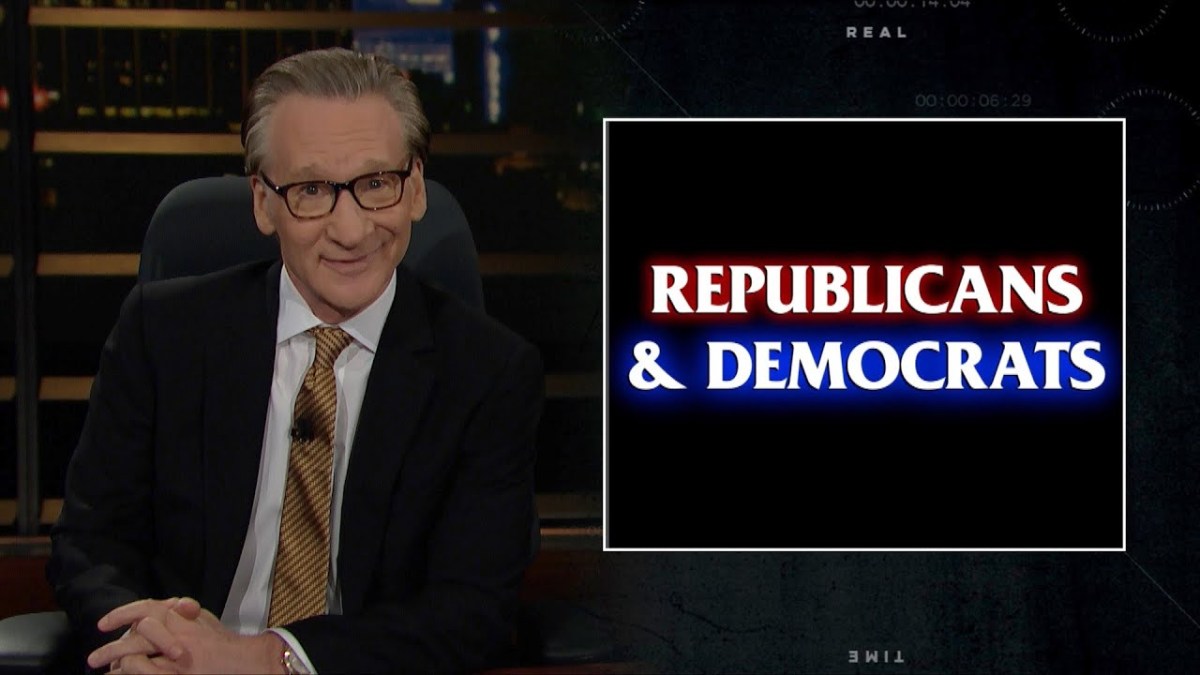Friday’s Real Time With Bill Maher was the last episode to air before the show takes a month-long break. (It’ll return on July 29.) Given the week’s Supreme Court decisions, Maher and his guests had no shortage of topics to choose from — but the overall effect was more understated than one might expect.
Maher addressed the way that the aforementioned legal rulings represented a break from the status quo many Americans had thought would never change. From there, he spoke about considering returning to his running “I know why you’re happy” gag, but commented that it wasn’t the week for it. “If you’re keeping score at home, it’s Guns 1, Women 0,” he said. And from there, Maher talked about Trump’s influence lingering after he left office. “He’s like a fart with bad hair,” said Maher.
Maher went on to discuss Clarence Thomas’s concurring opinion and the continuing revelations from the January 6 hearings. Perhaps the most charged moment happened when Maher alluded to the testimony Rusty Bowers gave in the hearings, and found that his name elicited little to no reaction. “No one watches the news at my show?” Maher asked in disbelief — then quickly summarized the Trump presidency in a handful of words.
Christine Emba, author of Rethinking Sex: A Provocation, was Maher’s first guest. “You’re here on an interesting day,” Maher said. Emba described herself as “completely shocked” at the ruling, and noted that the ruling in question was counter to public opinion. “The country’s moving in two very different directions,” Maher replied.
Maher then asked Emba about her book — and, more broadly, about the role of technology in modern relationships. Emba spoke about the complexity inherent to using apps for relationships — including the way that dating apps can reduce some of the confusion regarding interactions potentially leading to romance and/or sex.
Emba went on to speak about the legacy of the #MeToo movement; Maher, for his part, was more critical of the internet’s role in both dating and the spread of porn. (Maher was highly critical about the role of the internet in spreading porn.) Emba shared several of the conversations she’d had while researching her book, and the conceptual grey areas that emerged. And from there, Maher spoke about evolving attitudes towards sex.
“We can’t both be sluts,” Maher said. And before long, it was time to segue to the panel discussion, featuring Andrew Sullivan and Katie Herzog. Maher spoke of the Republican Party playing “the long game” when it came to Supreme Court appointments, while Sullivan was more skeptical, noting that a Clinton victory in 2016 would have dramatically changed the Court.
Maher brought up the subject of an increasingly divided United States and brought up a few comparisons, including to Israel and Palestine, Belgium and the former Czechoslovakia. Sullivan was more skeptical of this, arguing that things had been this way for a while, and that this made sense due to federalism.
Sullivan went on to talk about the case that had caused Roe to be overturned — and that the 15-week limit for abortions was higher than what you’ll find in Germany. Though Herzog was quick to point out that — due to the difference in healthcare systems between the two countries — someone would likely find out about a pregnancy much sooner in Germany than they would in the United States.
Sullivan went on to argue that Republicans would likely face a po;itical price for the Supreme Court’s recent ruling. He went on to make the case for more centrism — and expressed his frustration at the Biden presidency. This, in turn, led to a discussion of trans kids, gender roles, and the government’s position on both.
“We’re going to get killed just for having this discussion,” Maher said at one point, addressing the fact that all three have been criticized in the past for their comments on trans people. While Maher’s show — at its best — can bring together people with differing beliefs, there was a general sense of agreement among the three speakers. And, again — there was also the frustrating element of a heated discussion of trans rights without any trans people taking part.
In the second half of the segment, Maher mentioned that he’d been unaware of drag queen story hours before a few weeks earlier. “The Right is all about parents’ rights until the parents do something they don’t like,” Sullivan said — and went on to make a long and impassioned defense of drag queens. For his part, Maher offered a compromise between right and left: a drag queen story hour where the works of Ayn Rand were read.
Emba joined the panelists for Overtime, where the first question addressed the FDA’s ban of Juul. Herzog spoke about her frustration with this position, and argued that Juul had helped smokers wean themselves from cigarettes. This segued into a larger description of smoking and the devices one could use to smoke, whether it be tobacco or weed.
Somehow, this ended up turning into a heated discussion of menthol cigarettes and whether younger generations are having fewer children — and, in terms of the latter, whether that’s a good thing from an environmental perspective.
And then came New Rules, where Maher expressed horror at the idea of ketchup-flavored popsicles. (Which, to be honest, is understandable.) Also up for discussion? Monkeypox and the goblin shark’s Tinder photo. The bulk of the segment focused on Democrats’ losing demographic groups who have historically voted for them — with Maher’s argument being, essentially, an extended metaphor about good lawyers and bad lawyers.
At least, that’s how it began — with Maher returning to some of the subjects that irk him the most (such as the term “Latinx”), before making a grander point about policy stances that could potentially stand in the way of bipartisan actions. “The Democrats need to be like the lawyers you see on billboards,” Maher said. Though the conclusion he reached — that Democrats should keep Trump from attempting to interfere in another election — didn’t necessarily seem to contradict any of the policy stances he had critiqued earlier in the segment. It was an odd note on which to close the episode; let’s see where Maher and the nation are in a month’s time.
Thanks for reading InsideHook. Sign up for our daily newsletter and be in the know.


















